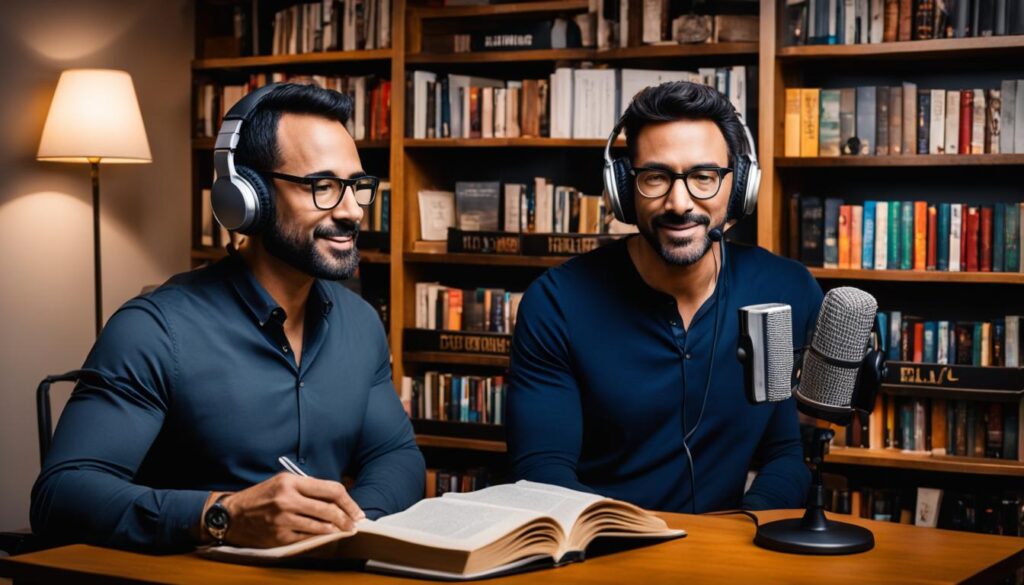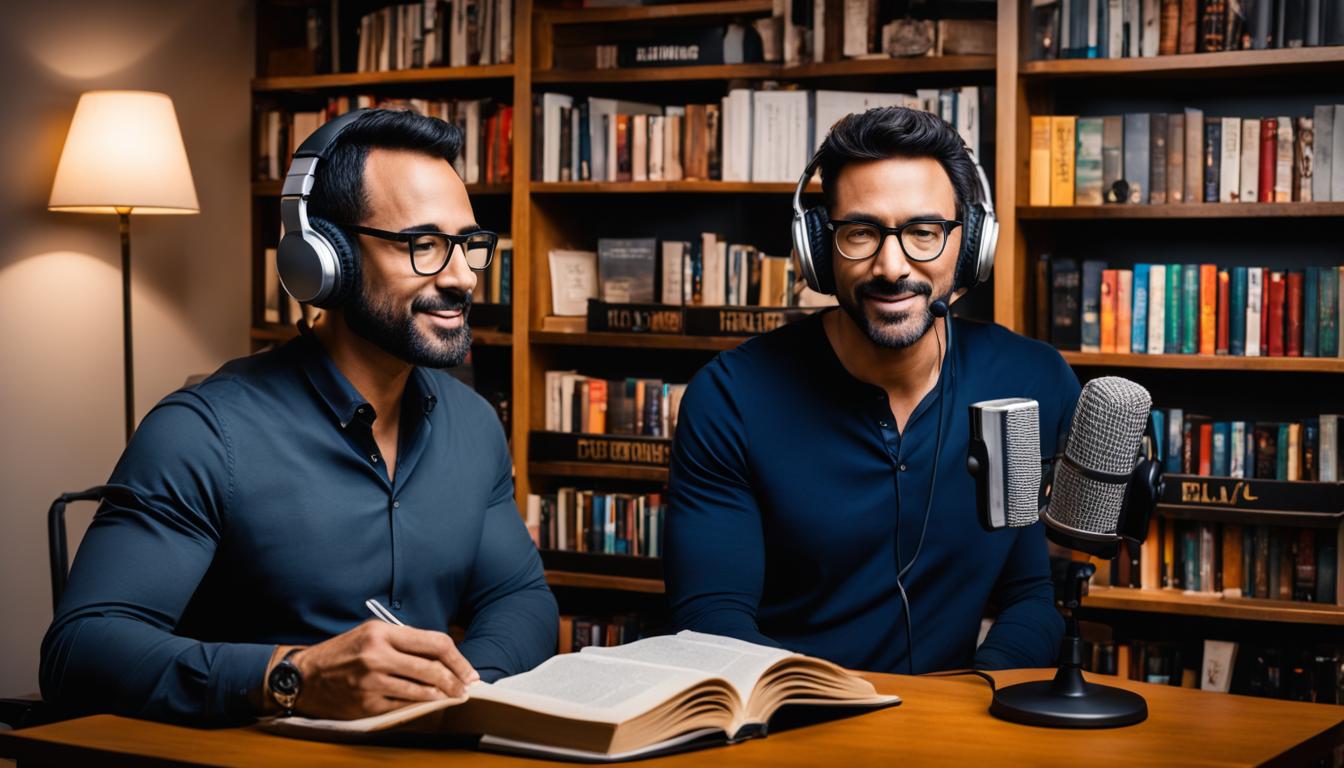Welcome to my latest article where we explore the fascinating world of audiobook narration through engaging podcast interviews. As an avid audiobook listener myself, I know the importance of an engaging narration and how it can bring a book to life. In this article, we will get to know the voices behind some of the most beloved books and uncover the secrets of successful audiobook narration.
Join me on this journey as we delve into the techniques used by talented narrators, discover the intricacies involved in creating high-quality audio content, and gain insights from top industry experts. We’ll explore the challenges and unique approaches employed by different narrators and discuss the future of audiobook narration.

Key Takeaways
- Engaging narrators can bring a book to life and make for a more enjoyable listening experience.
- Audiobook production involves a complex process of recording, editing, and mastering high-quality audio content.
- Top audiobook narrators offer valuable insights and tips for those looking to embark on a career in narration.
- Podcasts featuring audiobook narrator interviews are a great way to immerse oneself in the world of audiobook narration.
- The art of successful audiobook narration requires a unique approach and a deep understanding of character development and storytelling.
The Art of Audiobook Narration
Audiobook narration is a unique art form that requires a combination of storytelling skill, vocal technique, and a deep understanding of the written word. As a narrator, it’s my job to create an immersive experience for the listener, bringing the words on the page to life and engaging them in the story’s narrative.
One of the essential aspects of audiobook narration is pacing. A skilled narrator knows when to speed up or slow down the reading, emphasizing specific words, and building suspense. They must also create distinct character voices that maintain consistency throughout the audiobook and make it easy for listeners to follow the story.
The tone and inflection of the voice used for narration can make a significant difference in the listener’s experience. For example, whether to use a serious or humorous tone depends on the story genre, author’s intent and other factors. It’s essential to develop a unique voice and style as a narrator to differentiate oneself from others.
The narrator must convey emotion and connect with the listener, even when they’re performing a monotonous or less interesting part of the book. The challenge is to maintain the energy and enthusiasm levels throughout the recording, keeping the listeners engaged till the end.
Despite the challenges involved, audiobook narration can be an incredibly rewarding experience for those passionate about storytelling. It’s an art form that requires constant learning and improvement. The techniques used by experienced narrators can be learned with dedicated practice and careful study.
If you’re interested in becoming an audiobook narrator, or want to learn more about the craft, stay tuned as we dive deeper into the world of audiobook narration and production.
Behind the Scenes of Audiobook Production
As an audiobook narrator, I have had the privilege of working with talented producers and engineers, gaining valuable insights into the intricate process of audiobook production.
The first step in producing an audiobook is selecting the appropriate equipment, including microphones, headphones, and recording software. Once the recording equipment is in place, the narrator begins reading the book, while the engineer keeps a watchful eye on the sound levels to ensure that each word is captured clearly.
After recording is complete, the engineer gets to work editing the audio files, using tools like compression and EQ to clean up the sound and reduce background noise. The final step in the production process is mastering, which involves adjusting the overall sound levels to ensure that the final product meets the industry-standard for loudness.
“Audiobook production is a true labor of love, requiring a dedicated team of experts to bring a story to life through sound.”
At every stage of audiobook production, there are challenges to overcome and creative choices to make. For example, different genres of books may require different recording techniques, and producing an audiobook with multiple narrators requires extensive coordination and collaboration.
Despite these challenges, the end result of high-quality audiobook production is truly magical, bringing stories to life in a way that engages and entertains listeners for hours on end.
Voice Behind the Books
Have you ever wondered about the personalities behind the voices that bring your favorite books to life? Audiobook narrators have a unique talent and skill in transporting readers through their voice. I had the pleasure of speaking with a few of these talented voices, who were more than happy to share their personal experiences in the world of audiobook narration.
Rebecca Soler, a renowned young adult fiction narrator spoke candidly about her inspiration, “I am always moved by the author’s words and the emotions and motivations of the characters”. Simon Vanceinimitable voice behind many classic novels and bestsellers said, “To be an audiobook narrator, you need to have a genuine love of words and language. You need to be able to interpret meaning from texting and bring characters to life.”
However, audiobook narrators also face challenges while narrating. According to Xe Sands a celebrated romance audiobook narrator, “The biggest challenge is to be able to create unique voices for each character, ensuring that they are easily differentiated by the listener, without sounding forced.”
“Becoming the character you’re portraying can be difficult, especially if the character’s experiences and or personality are removed from your understanding,”
says
Adenrele Ojo
, a prolific narrator of romance and young adult literature.
Each narrator I spoke to had a unique approach to their craft. January LaVoy, another celebrated narrator whose voice has brought to life many non-fiction works, says, “I prepare by first trying to understand the heart of the book and the author’s message. I read through the book and get to know the author’s rhythm. I try to empathize with the author and the content.”
These are just a few of the many talented voices behind the many books we enjoy today, but their passion and dedication to the craft are all the same.
Insights from Top Audiobook Narrators
Who better to turn to for advice on audiobook narration than the top names in the industry? I had the pleasure of speaking with several of the best and brightest in the field, and they generously shared their experiences, tips, and insights with me.
“For me, it’s all about connecting with the material,” shared Julia Whelan, award-winning narrator of Gone Girl and The Girl He Used to Know. “I immerse myself in the story and try to bring the author’s vision to life through my voice.”
Master narrator Simon Vance, who has lent his voice to over 800 audiobooks, emphasized the importance of pacing and rhythm in successful narration. “A good narrator is like a musician, finding the right tempo and tone to reflect the emotions and mood of the story.”
“It’s a bit like acting,” mused Bahni Turpin, who narrated the acclaimed novel The Hate U Give. “You have to become the character, feel what they’re feeling, and convey that in your performance.”
As for the future of audiobook narration, there was a consensus among all the narrators I spoke with – the industry is only going to grow and thrive. “The demand for quality audiobooks is only increasing as more and more people discover the joys of listening to a great story,” noted Scott Brick, narrator of The Da Vinci Code and many other best-sellers.
Listening to these top audiobook narrators was a masterclass in the art of storytelling. Their passion and dedication to their craft is truly inspiring, and I hope their insights have given you a deeper appreciation for the work that goes into creating the audiobook versions of your favorite books.
Podcasts Featuring Audiobook Narrator Interviews
If you’re eager to hear more from the talented audiobook narrators featured in this article, there are plenty of great podcasts out there to explore. These podcasts offer in-depth interviews, behind-the-scenes insights, and valuable tips and tricks from some of the best voices in the industry. Here are a few of my top picks:
The Audio Book Review
The Audio Book Review is a podcast dedicated to all things audiobooks, featuring author interviews, narrator profiles, and in-depth discussions of the latest and greatest audiobook releases. Hosted by industry expert Karen Commins, this podcast offers a wealth of knowledge and insider insights for audiobook lovers of all stripes.
AudioFile Magazine
AudioFile Magazine is a leading source of reviews and recommendations for audiobooks, offering expert opinions on everything from narration quality to production values. Their podcast features interviews with top narrators, as well as discussions of the latest audiobook trends and releases.
The Audiobook Speakeasy
The Audiobook Speakeasy is a fun and informal podcast that features candid conversations with top audiobook narrators and industry insiders. Hosted by audiobook narrator Rich Miller, this podcast offers a unique and engaging look at the world of audiobook production.
These are just a few of the many great podcasts out there featuring audiobook narrator interviews. Whether you’re a die-hard fan of audiobooks or simply curious about the industry, these podcasts are sure to offer valuable insights and entertainment. Happy listening!
